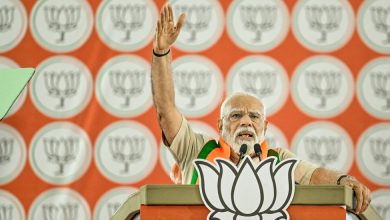Wall Street Warns About the End of Globalization

Breaking up
The war in Ukraine has upended the global economy. Severe sanctions have isolated Russia, and supply-chain shocks have roiled markets for food, energy and other commodities. Some of the most influential investors on Wall Street say that these disruptions — which come as the global economy was beginning to recover from the pandemic — may have permanently altered the world order.
Larry Fink of BlackRock sees an end to globalization. In his latest letter to shareholders, the asset management giant’s co-founder and C.E.O. writes that Russia’s invasion has broken the cross-border bonds between countries, companies and people that were already strained by the pandemic:
Howard Marks of Oaktree predicts a similar shift in his latest investor letter, citing the security risks of Europe’s reliance on Russian energy and the U.S. outsourcing of computer chip manufacturing:
The war will have many long-term economic consequences, the two note:
-
De-globalization will push inflation even higher, Fink writes, forcing central banks to choose between higher prices or lower economic activity. And Marks writes that countries whose economies benefited from outsourcing will be hurt from any reversal. That said, Fink sees countries like Brazil, Mexico and the U.S. benefiting from more local production.
-
The turmoil could bolster virtual currencies, Fink writes, noting that the U.S. is studying the implications of a digital dollar. Previously somewhat of a skeptic of cryptocurrencies, he now writes: “A global digital payment system, thoughtfully designed, can enhance the settlement of international transactions while reducing the risk of money laundering and corruption.” (BlackRock is now weighing adding crypto and blockchain offerings to its portfolio.)
-
The two differ on what the war means for green energy. Marks writes that countries will opt for more readily accessible sources of fuel, even if they’re not the cleanest. Fink, however, believes that shocks to oil prices and that same desire for national energy security will accelerate the adoption of clean energy.
HERE’S WHAT’S HAPPENING
Oil may surpass $200 a barrel, top traders predict. Sanctions on Russia and a lack of alternatives could lead to the loss of millions of barrels a day in crude that won’t be replaced anytime soon, industry executives said at a Financial Times conference. “Wakey, wakey,” Pierre Andurand, a prominent oil trader said. “We are not going back to normal business in a few months.”
The U.S. will exempt some Chinese imports from Trump-era tariffs. The move, which reinstates 352 of 549 eligible exemptions through the end of the year, was made amid pressure from business groups and lawmakers who said the levies were hurting American companies.
Big U.S. cities shrank last year. New census data found that New York, Los Angeles and San Francisco lost substantial numbers of residents, with 2021 being the slowest year for population growth in U.S. history.
More pandemic restrictions are being lifted. Mayor Eric Adams of New York is set to announce that professional athletes and performers in the city would no longer need to show proof of vaccination. And airlines have asked the White House to end federal mask mandates on planes and at airports.
Google allows apps to use their own billing systems. Spotify will be the first app on Google’s Play store that can bypass the company’s payments system, avoiding a commission. The move was announced as Google faces growing antitrust scrutiny over its app store.
The latest in the Russia-Ukraine war:
-
The latest companies pledging to suspend some operations in Russia include Renault, the biggest western automaker in Russia, and Nestlé, which had been called out specifically by Ukraine’s president. More than 400 companies have now withdrawn from Russia, removing products that reflect the power of Western culture and commerce.
-
One day, three summits: President Biden’s trip to Europe to discuss the war with allies includes back-to-back meetings with NATO, the G7 and the European Council.
-
The Russian stock market partly reopened after trading was halted for nearly a month. Under heavy restrictions, the shares that were allowed to trade mostly rose, but the market overall remains well below prewar values.
-
Vladimir Putin said that “unfriendly countries” may be forced to use rubles to pay for Russian oil and gas. Germany’s leader said that a boycott of Russian energy would “mean plunging our country and all of Europe into recession.”
-
For up-to-the-minute news, see The Times’s live blog and updated maps.
Will Wall Street’s bumper bonuses last?
Record deal volumes and worries about burned-out bankers calling it quits helped drive Wall Street’s bonus pool to an all-time high last year, according to estimates by Thomas DiNapoli, the New York State comptroller. The average bonus for a worker in the securities industry in New York City reached a record average of $257,500 in 2021, up 20 percent from the year before, the previous peak. But these bumper paydays may not last.
The paydays are good for New York’s economy. Bankers’ bonuses helped the city beat its forecast for income-tax revenue, DiNapoli said. (Employees in the securities industry make up 5 percent of the city’s private-sector work force but account for a fifth of its wages.) The securities industry accounted for nearly 20 percent of the state’s overall tax collection in its latest fiscal year.
But Wall Street’s riches have aggravated economic divides. The average salary of a securities industry worker in New York City, including bonuses, is now nearly five times as high as the rest of the private sector. According to DiNapoli, that presents a longer-term problem for the state. “In New York, we won’t get back to our pre-Covid economic strength until more New Yorkers and more sectors — retail, tourism, construction, the arts and others — enjoy similar success,” he said.
The boom may be short-lived. With the economy facing rising inflation, disruptions from the war in Ukraine and other uncertainties, the money may not flow as freely this year. I.P.O.s have already taken a hit: There have been about $11 billion worth of U.S. I.P.O.s so far this year, according to Dealogic, compared with $314 billion at the same point last year. DiNapoli said the city’s financial plan for fiscal 2022 was based on expectations that Wall Street’s bonus pool would fall by nearly 17 percent.
“We just have to understand what role it’s playing for you. Having some fun and exploring new things is a perfectly valid role.”
— Cristina Guglielmetti, a financial adviser in New York, on her many “crypto-curious” clients. A growing array of investment options make it easier to put digital tokens alongside traditional investments. But does crypto belong in your portfolio?
Artie Minson gets into the marijuana business
When Artie Minson left WeWork in 2020 after a tumultuous, five-year stint, including as co-C.E.O., he didn’t want another full-time job. But LeafLink, an online platform for licensed commercial sellers of cannabis, has persuaded Minson to join, DealBook is first to report.
There’s “a greater good” in helping to shape the industry, which has a checkered past and faces many legal hurdles, he told DealBook. Minson, 51, is joining LeafLink as president, C.O.O. and a board member, bringing his experience from WeWork, Time Warner Cable and AOL to help the marijuana platform grow.
Minson is no stranger to controversy. The marijuana use of Adam Neumann, a WeWork founder, was among the many problems that sank the company’s plans for an I.P.O. in 2019, when Minson was C.F.O. Of his turn to “cannabiz,” his research convinced him that “there are very clear economic, social and, increasingly, medical benefits from the ongoing legalization of this market.”
There is “maturation and normalization” of marijuana, said Ryan Smith, LeafLink’s co-founder. “We as a society have decided it’ll be here long-term.” LeafLink, founded in 2015, operates in 30 states and provinces in the U.S. and Canada. Minson bringing his executive experience to the industry is a “step forward for the cannabis space,” Smith said.
LeafLink doesn’t actually handle any cannabis. It facilitates transactions and provides data and tech for sellers, processing billions of dollars in orders last year, or about 40 percent of U.S. wholesale cannabis commerce. Not being “plant-touching” makes raising capital easier, Smith said: LeafLink has raised $130 million from Founders Fund, Thrive Capital and others. But because marijuana is still illegal at the federal level in the U.S., running a platform for companies operating under a patchwork of state laws is complicated.
LeafLink won’t focus on federal legalization, Minson said. Despite movement in Congress, the Biden administration has been slow-walking its policy. In the meantime, business is booming, in part because of legalization in New York and New Jersey. Yesterday, the cannabis producers Cresco Labs and Columbia Care announced a $2 billion deal that would create the largest U.S. marijuana company.
THE SPEED READ
Deals
-
Toshiba shareholders rejected a plan to break up the Japanese conglomerate. (WSJ)
-
“An Alleged Fraud Uncovered by a Short Seller Ends in Gunfire” (WSJ)
-
The best-performing companies that have gone public via SPAC are focused on crypto. (Bloomberg)
Policy
-
A jury acquitted a former Boeing technical pilot of fraud charges tied to the 737 Max jet. (NYT)
-
“Mandatory Meetings Reveal Amazon’s Approach to Resisting Unions” (NYT)
-
Jay Powell, the Fed chair, warned that cryptocurrencies could pose risks to U.S. financial stability. (WSJ)
-
NASA will seek bids for future lunar spacecraft from companies other than SpaceX, which won the initial contract to return American astronauts to the Moon. (NYT)
Best of the rest
-
Madeleine Albright, the first woman to serve as secretary of state, died yesterday. She was 84. (NYT)
-
Flights are taking up to 40 percent longer as airlines avoid Russian airspace. (Insider)
-
MacKenzie Scott published a new list of donation recipients, as her philanthropic giving rose to $12 billion. (NYT)
-
Should morality really be the business of C.E.O.s? (Times Opinion’s “Sway”)
-
Steve Wilhite, the inventor of the moving computer images known as GIFs, died from Covid. His achievement was memorialized online by, well, GIFs. (Bloomberg)
We’d like your feedback. Please email thoughts and suggestions to [email protected].




